NURSING NURS 5315 (NURS5315)
University Of Texas - Arlington
All 43 results
Sort by
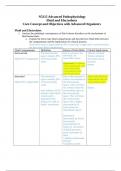
-
N5315 Advanced Pathophysiology Fluid and Electrolytes Core Concept and Objectives with Advanced Organizers
- Exam (elaborations) • 14 pages • 2024
-
- $8.49
- + learn more
N5315 Advanced Pathophysiology Fluid and Electrolytes Core Concept and Objectives with Advanced Organizers Fluid and Electrolytes 1. Analyze the pathologic consequences of fluid volume disorders on the mechanisms of fluid homeostasis. a. Explain the three main fluid compartments and describe how fluid shifts between the compartments and the implications for clinical practice. Total body water is approximately 60% of the body weight and is spread between the three main fluid compartments...
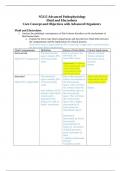
-
N5315 Advanced PathophysiologyFluid and ElectrolytesCore Concept and Objectives with Advanced Organizer
- Exam (elaborations) • 14 pages • 2024
-
- $10.49
- + learn more
Endometrial cycle and the occurrence of ovulation -menstrual cyclestarts with menarche (first menstruation) ends with menopause (cessation of menstrual flow for 1 year) -Cycles -anovulatory at first may vary in length from 10 to 60 days or more. -As adolescence proceeds into adulthood, regular patterns of menstruation and ovulation are established at intervals ranging from 21 to 45 days. -Menstruation continues to recur in a recognizable and characteristic pattern during adulthood, ...
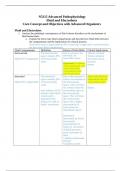
-
N5315 Advanced Pathophysiology Fluid and Electrolytes Core Concept and Objectives with Advanced Organizers
- Exam (elaborations) • 14 pages • 2024
-
- $8.49
- + learn more
N5315 Advanced Pathophysiology Fluid and Electrolytes Core Concept and Objectives with Advanced Organizers Fluid and Electrolytes 1. Analyze the pathologic consequences of fluid volume disorders on the mechanisms of fluid homeostasis. a. Explain the three main fluid compartments and describe how fluid shifts between the compartments and the implications for clinical practice. Total body water is approximately 60% of the body weight and is spread between the three main fluid compartments...
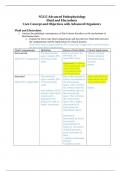
-
N5315 Advanced Pathophysiology Fluid and Electrolytes Core Concept and Objectives with Advanced Organizers
- Exam (elaborations) • 14 pages • 2024
-
- $8.49
- + learn more
N5315 Advanced Pathophysiology Fluid and Electrolytes Core Concept and Objectives with Advanced Organizers Fluid and Electrolytes 1. Analyze the pathologic consequences of fluid volume disorders on the mechanisms of fluid homeostasis. a. Explain the three main fluid compartments and describe how fluid shifts between the compartments and the implications for clinical practice. Total body water is approximately 60% of the body weight and is spread between the three main fluid compartments...
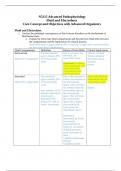
-
module2sg N5315 Advanced Pathophysiology Fluid and Electrolytes Core Concept and Objectives with Advanced Organizers
- Exam (elaborations) • 14 pages • 2024
-
- $8.99
- + learn more
N5315 Advanced Pathophysiology Fluid and Electrolytes Core Concept and Objectives with Advanced Organizers Fluid and Electrolytes 1. Analyze the pathologic consequences of fluid volume disorders on the mechanisms of fluid homeostasis. a. Explain the three main fluid compartments and describe how fluid shifts between the compartments and the implications for clinical practice. Total body water is approximately 60% of the body weight and is spread between the three main fluid compartments...
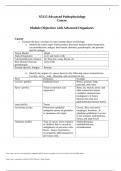
-
N5315 Advanced Pathophysiology Cancer Module Objectives with Advanced Organizers Questions with 100% Correct Answers | Verified | Latest Update 2024
- Exam (elaborations) • 7 pages • 2024
-
- $8.49
- + learn more
N5315 Advanced Pathophysiology Cancer Module Objectives with Advanced Organizers Cancer 1. Examine the basic concepts of cancer nomenclature and biology. a. Identify the cancer types which produce the tumor markers alpha fetoprotein, carcinoembryonic antigen, beta human chorionic gonadotropin, and prostate specific antigen. Tumor Marker Origin Alpha Fetoprotein Liver and Germ Cells Carcinoembryonic Antigen GI, Pancreas, Lung, Breast, etc Beta Human Chorionic gonadotropin Germ Cells ...
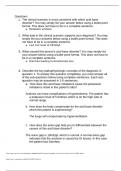
-
NURS 5315 cs1 Questions with 100% Correct Answers | Verified | Latest Update 2024
- Exam (elaborations) • 3 pages • 2024
-
- $8.49
- + learn more
Questions 1. The clinical scenario is most consistent with which acid base disorder? You may simply list your answer below using a bullet point format. This does not have to be in a complete sentence. a. Metabolic acidosis 2. What data in the clinical scenario supports your diagnosis? You may simply list your answers below using a bullet point format. This does not have to be in a complete sentence. a. Low Co2 level of 18mEq/L 3. What caused this person's acid base disorder? You may si...
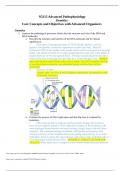
-
N5315 Advanced Pathophysiology Genetics Core Concepts and Objectives with Advanced Organizers
- Exam (elaborations) • 9 pages • 2024
-
- $8.99
- + learn more
N5315 Advanced Pathophysiology Genetics Core Concepts and Objectives with Advanced Organizers Genetics 1. Analyze the pathological processes which alter the structure and role of the DNA and RNA molecules. a. Describe the structure and function of the DNA molecule and its clinical significance. i. Four types of nitrogenous bases of DNA include adenine, cytosine, guanine, and thymine commonly represented as their first letter. Physical structure of DNA is the double- helix model which c...
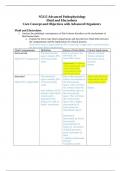
-
N5315 Advanced Pathophysiology Fluid and Electrolytes Core Concept and Objectives with Advanced Organizers
- Exam (elaborations) • 14 pages • 2024
-
- $8.99
- + learn more
N5315 Advanced Pathophysiology Fluid and Electrolytes Core Concept and Objectives with Advanced Organizers Fluid and Electrolytes 1. Analyze the pathologic consequences of fluid volume disorders on the mechanisms of fluid homeostasis. a. Explain the three main fluid compartments and describe how fluid shifts between the compartments and the implications for clinical practice. Total body water is approximately 60% of the body weight and is spread between the three main fluid compartments...
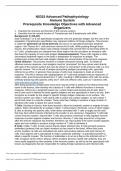
-
N5315 Advanced PathophysiologyImmune SystemPrerequisite Knowledge Objectives with AdvancedOrganizers1
- Exam (elaborations) • 8 pages • 2023
-
- $9.49
- + learn more
N5315 Advanced Pathophysiology Immune System Prerequisite Knowledge Objectives with Advanced Organizers 1. Examine the structure and function of the immune system. a. Describe how the normal function of T-lymphocyte and B-lymphocyte cells differ. Background: P. 225-226 Each individual T or B cell specifically recognizes only one particular antigen, but the sum of the population of lymphocytes specificities may represent millions of foreign antigens. This process is called the generation...

Did you know that on average a seller on Stuvia earns $82 per month selling study resources? Hmm, hint, hint. Discover all about earning on Stuvia


